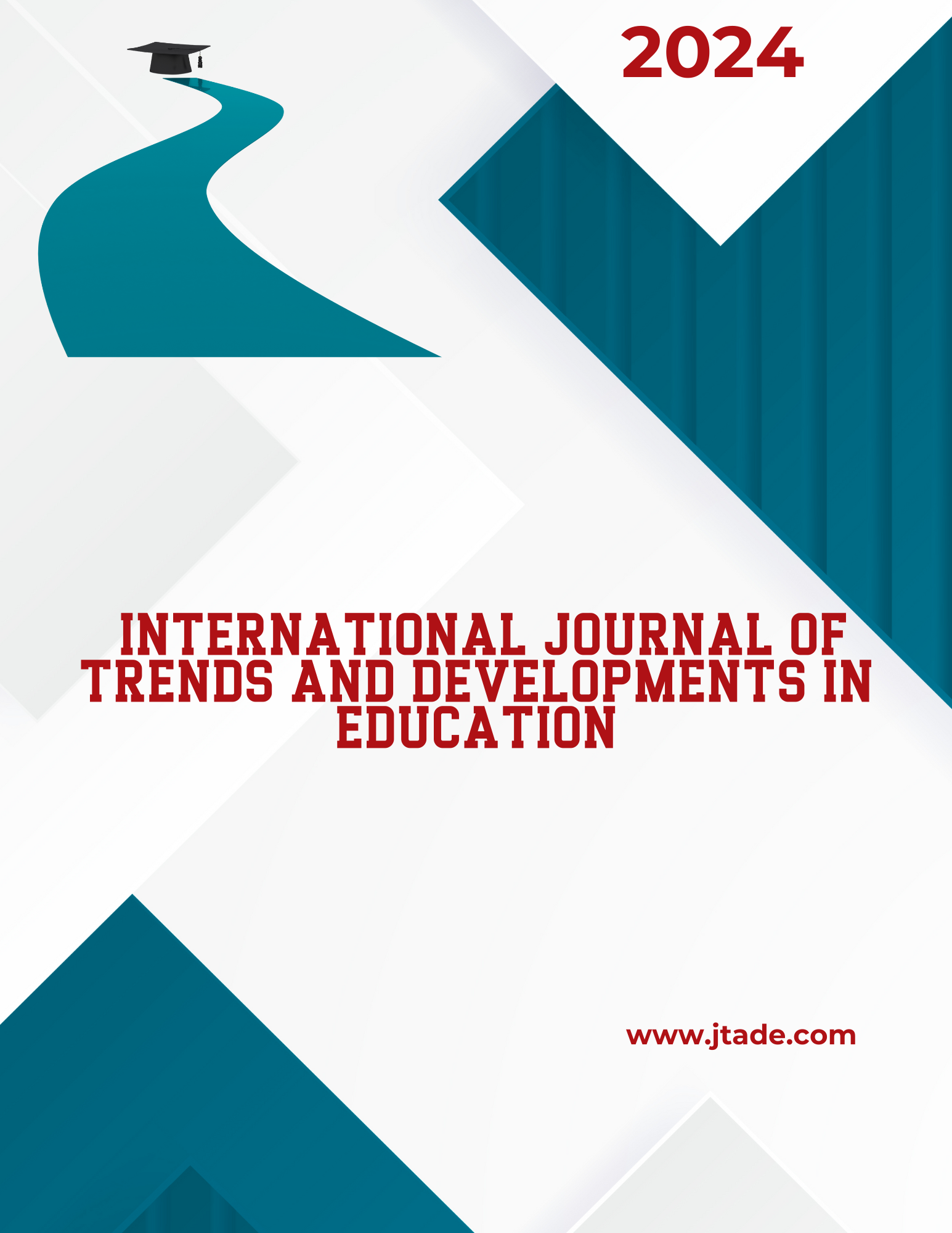Research article | Open Access
International Journal of Trends and Developments in Education 2021, Vol. 1(1) 19-32
Researching Effects of Pandemic Period on 8th and 12th Grade Students Preparing for Exams in 2020 ' 2021 Academic Year
pp. 19 - 32
Publish Date: December 15, 2021 | Single/Total View: 68/137 | Single/Total Download: 74/143
Abstract
The purpose of this study is examining the positive and negative effects of the pandemic period on the 8th and 12th grade students preparing for the exams in 2020-2021 academic year. This study was carried out by fifteen 8th and 12th grade students studying at a secondary school in two different high schools in the center of Gaziantep in Southeast Anatolia region in 2020-2021 academic year. Semi-structured interview technique was used as a data collection tool in this study. Descriptive and content analysis were used in the analysis of the obtained data. According to the results of the study, some positive and negative effects of the pandemic period were found on the 8th and 12th grade students who were preparing for the LGS and YKS exams. While there are negative results such as getting behind of the subjects, shortening the course time, experiencing technological difficulties, internet access problems, physical and mental effects, anxiety about illness; some students stated that shortening the course time has positive effects on eye health and they have more time to study as they stay at home and by this means they stated that this situation positively affected their courses. The findings were discussed in the light of the literature and various suggestions were made.
Keywords: Covid-19, Distance education, LGS and YKS exams, Student opinion
APA 7th edition
TUNC, C., TUNC, A., DEDE, E., TASARSU, E., & KILIC, E. (2021). Researching Effects of Pandemic Period on 8th and 12th Grade Students Preparing for Exams in 2020 – 2021 Academic Year. International Journal of Trends and Developments in Education, 1(1), 19-32.
Harvard
TUNC, C., TUNC, A., DEDE, E., TASARSU, E. and KILIC, E. (2021). Researching Effects of Pandemic Period on 8th and 12th Grade Students Preparing for Exams in 2020 – 2021 Academic Year. International Journal of Trends and Developments in Education, 1(1), pp. 19-32.
Chicago 16th edition
TUNC, Cevdet, Adem TUNC, Erdem DEDE, Emre TASARSU and Emine KILIC (2021). "Researching Effects of Pandemic Period on 8th and 12th Grade Students Preparing for Exams in 2020 – 2021 Academic Year". International Journal of Trends and Developments in Education 1 (1):19-32.
Anderson, J. (2020). The coronavirus pandemic is reshaping education. Quartz Daily Brief (retrieved from https://qz. com/1826369/how-coronavirus-is-changing-education/).
Aslan, R. (2020). Tarihten günümüze epidemiler, pandemiler ve covid-19. Ayrıntı Dergisi, 8(85).
Demir, E. (2014). Uzaktan eğitime genel bir bakış. Dumlupınar Üniversitesi Sosyal Bilimler Dergisi – Sayı 39 – Ocak 2014
Denzin, N. K., & Lincoln, Y. S. (1994). Handbook of Qualitative Research: California, Sage Publications, USA
Dinçer, Ö. G. S. (2016). Bilgisayar destekli eğitim ve uzaktan eğitime genel bir bakış. Adana, Seyhan, Türkiye.
D’Orville, H. (2020). COVID-19 causes unprecedented educational disruption: Is there a road towards a new normal?. Prospects, 49, 11-15.
Enfiyeci, T., & Filiz, S. B. (2019). Uzaktan eğitim yüksek lisans öğrencilerinin topluluk hissinin çeşitli değişkenler açısından incelenmesi. Tübav Bilim Dergisi, 12(1), 20-32.
Ertuğ, C. A. N. (2020). Coronavirüs (Covid-19) pandemisi ve pedagojik yansımaları: Türkiye’de açık ve uzaktan eğitim uygulamaları. Açıköğretim Uygulamaları ve Araştırmaları Dergisi, 6(2), 11-53.
Hakan, E. Y. G. Ü., & Karaman, S. (2013). Uzaktan eğitim öğrencilerinin memnuniyet algıları üzerine bir araştırma. Kırıkkale Üniversitesi Sosyal Bilimler Dergisi, 3(1), 36-59.
Fidan, N. (2012). Okulda Öğrenme ve Öğretme (3. Baskı). Ankara: Pegem Yayıncılık.
Garfin, D. R., Silver, R. C., & Holman, E. A. (2020). The novel coronavirus (COVID-2019) outbreak: Amplification of public health consequences by media exposure. Health psychology, 39(5), 355.
Gökçe, F. (2012). Öğretmen ve velilerin, öğrencilerin okulda geçirdikleri zaman, ders ve dinlenme süreleri ile tatiller ve okul dönemleri konusundaki görüşleri. Kuram ve Uygulamada Eğitim Bilimleri, 12(4), 2541-2560.
Karakaya, M., & Aksoy, H. H. (2005). Uzaktan eğitim yüksek lisans çalışması. Ankara Üniversitesi Eğitim Fakültesi.
Kılınç, M. (2015). Uzaktan eğitim uygulamalarının etkililiği üzerine bir araştırma (İnönü Üniversitesi Uzaktan Eğitim Merkezi İlahiyat Lisans Tamamlama Programı örneği). İnönü Üniversitesi Eğitim Bilimleri Enstitüsü. 1-132 ss.
Livingstone, S. & Blum-ross, A. (2018). Ekran süresi’ kavramının artık modası geçmiş olduğu sonucuna varabiliriz. . TRT Akademi , 3 (6) , 752-763 . Retrieved from https://dergipark.org.tr/tr/pub/trta/issue/38692/456498.
Merriam-Webster. (2020). Outbreak vs. Epidemic: SpreadingIllness. https://www.merriam-webster.com/words-at-play/spanish-flu (Erişim Tarihi: 6 Mayıs 2020).
Miles, M. B., & Huberman, A. M. (1994). Qualitative data analysis: An expanded sourcebook. sage.
MEB (2020a). Bakan Selçuk’tan uzaktan eğitimle ilgili en çok sorulan 10 soruya yanıt. 23 Mart 2020 tarihinde <http://www.meb.gov.tr/bakan-selcuktan-uzaktan-egitimle-ilgili-en-cok-sorulan-10-soruyayanit/haber/20579/tr> adresinden erişildi.
Şimşek, H., & Yıldırım, A. (2011). Sosyal Bilimlerde Nitel Araştırma Yöntemleri. Ankara: Seçkin Yayıncılık.
Yin, R. K. (2009). Case study research: Design and methods (Vol. 5). sage.
